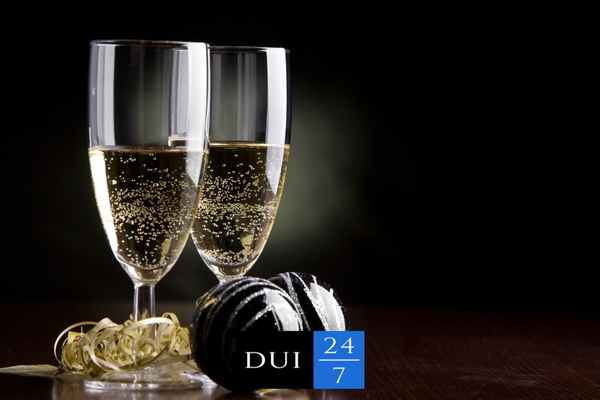Drinking and driving is never a good idea. But during the holidays, when people are celebrating and in a party mood, it can be even harder to resist the temptation because New Year's Eve is one of the most popular nights for drunk driving.
Really, no one wants to start the new year off with a DUI. If you've been charged with DUI, there are some things you need to know. And if you haven't been charged with DUI, there are some things you can do to help avoid it.
Blood Alcohol Concentration (BAC)
Your blood alcohol concentration (BAC) is the amount of alcohol in your blood. The influence of alcohol depends on a variety of factors, including your weight, gender, how much you've eaten, and how fast you're drinking. Generally speaking, the higher your BAC, the more impaired you will be.
At a BAC of 0.02, you may feel relaxed and have a slight decrease in inhibitions. At a blood alcohol level of 0.05, you may have trouble with fine motor skills and your judgment may be impaired. At a BAC of 0.08, you may have trouble with coordination and balance. You may also have trouble with short-term memory and decision-making as an intoxicated driver.

At a BAC of 0.10, you may have slurred speech and trouble with coordination. You may also have trouble with reaction time and judgment. At 0.15 blood level of alcohol, you may have trouble walking and standing. You may also vomit and lose consciousness.
A BAC of 0.08 is the legal limit for driving in most states. However, you can be charged with DUI even if your BAC is below 0.08 if you are displaying other signs of impairment, such as swerving or failing a field sobriety test.
DUI Charge
Driving under the influence (DUI) is a crime in most states in the U.S. It involves operating a motor vehicle while impaired by alcohol or drugs. Depending on the state, the legal limit for blood alcohol content (BAC) is 0.08 percent.
The arrest rates over DUI-related fatal accidents demonstrate how the effects of alcohol can impair someone's ability to drive. Alcoholic consumption, in short, hinders one's ability to operate a vehicle and can result in severe consequences including deadly crashes, making it one of the leading causes of preventable deaths in the U.S.
Most states have laws that make it a crime to drive with a BAC above the legal limit. These are called "per se" DUI laws. In these states, it doesn't matter whether your ability to drive was actually impaired or being a sober driver.
In other states, you can be charged with DUI if you were driving recklessly or erratically, even if your BAC wasn't above the legal limit. These laws are called "impairment" DUI laws.
DUI is usually a misdemeanor offense, but it is amount to a felony charge in some cases. For example, if you have been charged with DUI before, or if someone was injured because of your drunk driving, you may be facing a felony charge.
New Years' and Fatal DUI Accidents
New Year's Eve is known for being a particularly dangerous holiday due to the high number of DUI crashes. There are several reasons for this.
First, people are more likely to be out drinking on New Year's Eve than on any other night of the year. Second, many people are celebrating and in a party mood, which can make it harder to resist the temptation to drink and drive. Third, there are often more impaired drivers on the road on New Year's Eve than on any other night.
These drunk drivers are more likely to cause crashes.
According to the National Highway Traffic Safety Administration (NHTSA), there were 781 people killed in drunk driving crashes on New Year's Eve in 2016.
New Year's Eve Accident and DUI Statistics
To put it simply, New Year's Eve is one of the most dangerous nights of the year to be on the road.
According to Mothers Against Drunk Driving (MADD), drunk driving crashes claim the lives of more than 300 people every year on New Year's Eve.
In fact, MADD reports that 40 percent of all traffic fatalities on New Year's Day are caused by drunk driving.
And it's not just New Year's Eve. The whole holiday season, from Thanksgiving to New Year's Day, is a particularly dangerous time on the roads. MADD reports that between Thanksgiving and New Year's Day, there is an average of one drunk driving death every 53 minutes.
How Can You Prevent a DUI on New Year's Eve?
The best way to prevent a DUI on New Year's Eve is to not drink and drive. If you're going to be drinking, make sure you have a designated driver or another way to get home safely. There are a few other things you can do to help avoid getting a DUI on New Year's Eve.
First, if you're going to be drinking, pace yourself. Drink slowly and have a drink of water in between alcoholic beverages.
Second, eat something before you start drinking. Drinking on an empty stomach can make you feel drunker than you actually are.

Third, if you're at a party, make sure you have a way to get home before you start drinking. It's much easier to avoid drunk driving if you have a ride lined up ahead of time.
Fourth, if you see someone who has been drinking and is about to drive, do what you can to stop them. Taking away their keys or calling a cab for them can help prevent a drunk driving crash.
DUI on New Year's Eve can be prevented by avoiding excessive amounts of alcohol at holiday parties or family gatherings. With alcohol impairment caused by alcohol consumption comes an increased crash rate, and possibly DUI crash fatalities. It is best to have a plan for getting home safely before the drinking begins.
How to Handle a DUI Charge
If you are charged with DUI, the first thing you should do is contact a lawyer. A lawyer can help you understand the charges against you and the possible penalties. They can also help you create a defense and represent you in court.
The penalties for DUI depend on the state, but they can include jail time, fines, driver's license suspension, and mandatory alcohol education classes. In some states, you may also be required to install an ignition interlock device in your car. This device prevents your car from starting if it detects alcohol on your breath.
Final Thoughts
DUI is a serious offense with potentially severe penalties with life-altering. Not only can it land you in jail, but it can also cost you your driver's license and a lot of money. If you're charged with DUI, the best thing you can do is contact an attorney immediately. You should not risk trying to defend yourself without legal assistance. DUI Lawyers 24/7 is a top criminal defense law firm focused on DUI cases. Our team of experienced DUI lawyers to help you fight your charges and get the best possible outcome in your case.

